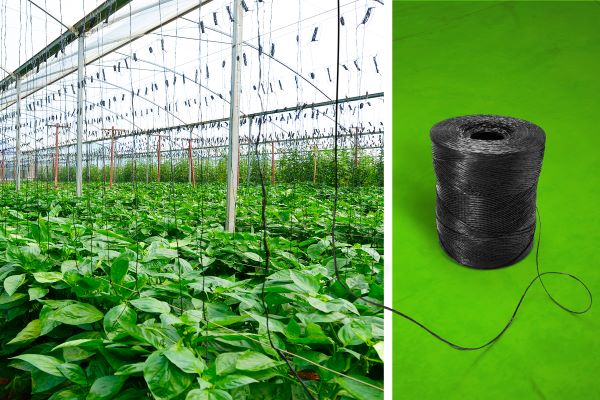Certified industrial compostable ecovio T 2206 as ideal material for twines used to grow annual fruit and vegetables in greenhouses

BASF expands its certified compostable biopolymer ecovio that can also be used to manufacture black twines used to grow annual fruit and vegetables in commercial greenhouses.
The grade ecovio T 2206 is certified industrial compostable according to EN13432. This means that after harvesting the twines can be collected together with the plant residues and transported to industrial composting facilities (depending on local regulations) where they biodegrade. With this new end-of-life option for twines, persistent microplastics in organic waste can be avoided while at the same time more green waste can be turned into valuable compost. The industrial compostable ecovio® thus supports organic recycling and helps to close the nutrient loop to achieve a circular economy.
Twines made of ecovio T 2206 can be used to help creepers like tomatoes and cucumbers to climb upwards in greenhouse structures in many climates from Europe, South America to Asia and Canada: Tests show the twines’ excellent performance until the end of the crop cycle. After harvesting farmers do not have to laboriously separate the twines from the plants but simply collect them together for composting. The certified industrial compostable twines do not only show benefits for farmers but also for manufacturers: ecovio T 2206 can be produced on standard polypropylene (PP) machinery for twines.
BASF’s biopolymers portfolio for sustainable agriculture and food production also includes the certified soil-biodegradable grade ecovio M 2351. It was especially developed for mulch films used in agriculture and horticulture to increase the yield, speed up harvesting as well as to save water and herbicides. Mulch films made of ecovio M 2351 are completely and biologically degraded by microorganisms like bacteria and fungi that exist naturally in the soil. Farmers can simply plough the mulch films made of ecovio M 2351 back into the ground after harvest. This saves time and money - and it helps to avoid persistent microplastics in agricultural soil which would occur, if farmers used conventional mulch films made of non-biodegradable polyethylene (PE).
Subscribe to our newsletter & stay updated.